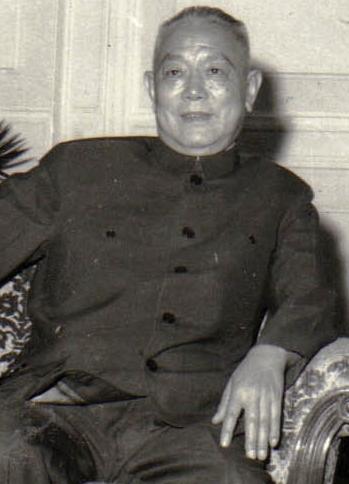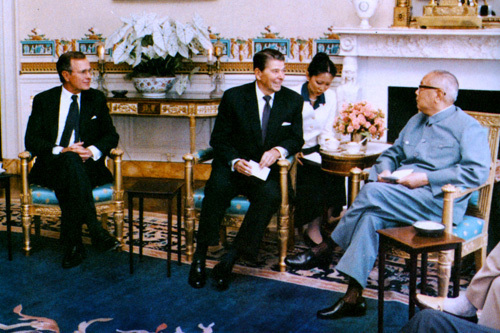<Back to Index>
- Minister of Finance of People's Republic of China Li Xiannian, 1909
PAGE SPONSOR


Li Xiannian (23 June 1909 – 21 June 1992) was President of the People's Republic of China between 1983 and 1988 and then chairman of the Chinese People's Political Consultative Conference until his death. He was an influential political figure throughout the PRC, having been a member of the Politburo of the Communist Party of China from 1956. He is one of the architects of China's economic recovery after the Cultural Revolution, and is considered one of the Eight Immortals of Communist Party of China.
Li joined the Communist Party of China in 1927, and served as an army captain and political commissar for the Chinese Red Army during the Long March.
After the Communists victory in China, Li was appointed Party Secretary of Hubei Province in China from 1949 – 1954, and Commander of the Hubei Province's military garrison and political commissar. In 1950, Li was elected the first Chairman of the Hubei People's Government. While he was working in Hubei, Li was appointed Party Secretary of Wuhan and Vice Chairman of the PRC's Military Commission South - Central China.
In 1954, Li was appointed China's Minister of Finance, and held on to this position for 13 years, until the Cultural Revolution. Li was also appointed Deputy Prime Minister during 1954 – 1967. In 1967, he fell out of favor during the Cultural Revolution.
Li was notable as the only civilian official to serve with Premier Zhou Enlai throughout the entire Cultural Revolution. In 1976, during the final days of the Cultural Revolution. Li played an instrumental role in destroying the Gang of Four. Li was appointed Vice Chairman of the Politburo and a member of the Central Military Commission.
When Hua Guofeng rose to leadership after the death of Mao Zedong, Li became Hua's chief economic adviser. If Hua had been successful in his efforts to achieve supreme power, Li would have become one of the most powerful officials in China, but Li's political career stalled when Deng Xiaoping eclipsed Hua as China's "paramount leader". For the rest of his career, Li grumbled that his own achievements during the brief Hua interregnum were not sufficiently recognized as the basis of the progress experienced in China during the 1980s.
Li resented the younger officials who Deng promoted above Li, most notably Zhao Ziyang. Li was a prominent opponent of Zhao's efforts to reform the Chinese economy, and disliked Zhao personally for Zhao's appreciation of "foreign stuff" and for Zhao's willingness to learn from the economic models that had been successful for the Asian Tiger economies and for the West. According to Zhao, Li "hated me because I was implementing Deng Xiaoping's reforms, but since it was difficult for him to openly oppose Deng, he made me the target of his opposition."
In 1983, after the passing of a new Constitution, Li was appointed President at the age of 74. In the political environment of China in the 1980s, the role of President was "largely ceremonial", but recognized Li's role as a respected Party elder. In 1984, Li Met with US President Ronald Regan during Regan's visit to China, notably discussing the status of Taiwan with the President. Li visited the United States in July 1985, the first time a Head of State from the People's Republic China visited the USA.
In 1988, Li resigned from his position as President of the People's Republic Of China and was replaced by Yang Shangkun. Li was then named Chairman of the CPPCC. During the Tiananmen Square protests of 1989, Li was one of the hardline Party elders who pushed for a strong response to the demonstrations, and supported Li Peng's desire to use military force to suppress the protests. Li continued to serve in government until his death in 1992.
